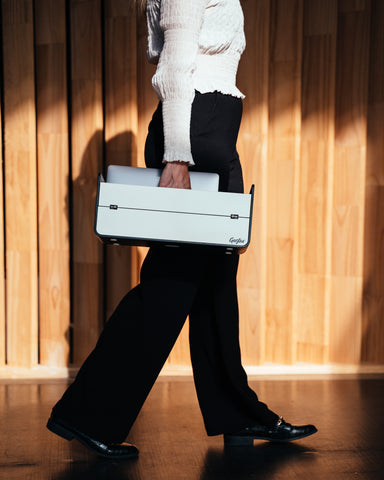The Future of Work

You do most of your work in your home office. When you do enter the company building, awaiting you is a cosy lounge area for informal meetings, individual offices for concentrated work and telephone booths for confidential conversations. You can reserve all areas online in advance.
To ensure that your mobile equipment such as smartphones, notebooks, notepads etc. are at your fingertips, you have an office tool such as the Gustav Lounger or Gustav Original to store your belongings.
This is roughly what working will look like in 2030.
This article provides information on current trends in the world of work, what employees and self-employed people need to prepare for and how to deal with uncertainties.
Future trends for the working world of tomorrow
The pandemic has made it clear that many office tasks can be done perfectly well within one's own four walls. Companies are currently sounding out how much the home office should be utilised in the future. Current studies and surveys suggest that the world of work in 2030 will be comprised of more agile working and mobile working. But what does that mean in concrete terms?
Work-life blending: fluid transitions
Through mobile working, flexible working hours and teleworking, the transitions between work and private life appear increasingly fluid. Lunch breaks are no longer spent with colleagues in the canteen, but in the on-board bistro of an ICE train, in a café or at the kitchen table together with the family. In turn, important phone calls take place in the evening just before the theatre performance. This image of the new world of work may be desirable for some employees, though others prefer regular working hours in the company office and do not want to boot up the company laptop during their free time.
Traditional working, with the distinction between work at the workplace and private life outside the company, seems to be disappearing. Work-life blending is becoming the trend of the future. This development cannot be stopped. With Gustav, on the one hand you can take your office with you wherever you go, but on the other hand you can also stow it away in a data- and travel-safe way with a few flicks of the wrist.
Work-life blending does not mean being available 24/7. Life demands attention on many fronts. Those who cultivate their hobbies without putting the company phone aside cannot switch off in the truest sense of the word and do not recover sufficiently. Therefore it is important to find individual and practicable solutions to the new paradigm of work/life balance.
Soft skills: communication, empathy and self-management
Telephone conferences and zoom meetings save long journeys, but on the other hand they reduce the available channels of communication. Gestures, postures and brief eye contacts between colleagues are eliminated – especially when cameras are switched off. Consequently, talking and listening take on greater importance.
Empathy also plays a special role: the emotional bond between colleagues as well as with the superior requires a high degree of attention and active listening. Over Zoom, a colleague can only tell through the words of their peer whether they really understand them, as gestures and facial expressions are often not visible.
The same applies to self-management: no colleague is going to knock on the office door and remind you it’s time for a lunch break. Each employee is responsible for keeping to the prescribed break and working hours. If this is difficult, coaching can help to practise new strategies.

A culture of trust: the basis of a sustainable corporate culture
All the aspects already described make one thing clear: the classic management culture no longer applies in the new world of work. Employees in the home office cannot be controlled in the same way as in the company office. Therein lies a great opportunity: if a company relies on trust instead of control, it can release the inner motivation of its employees and spur them on to better work results.
In fact, the latest findings from neuroscience paint a positive picture: people are not unmotivated beings who have to be kept at work by pressure and control. On the contrary, they are social creatures who want to contribute to the community and find their place in it. Giving up power and scope for decision-making is a challenge for leaders. But it is worth mastering.
Activity-based working: Environment and tools
Activity-based working means that the working environment is perfectly matched to the activity: the design of the respective area supports every form of work - from focused, distraction-free work to creative brainstorming in a team. The environment appeals to all the senses and promotes the necessary mood in each case. In this way, activity-based working increases the performance of employees.
With the multiple award-winning Gustav, employees have the perfect office tool for activity-based working at their disposal. The personal and individual office equipment fits into the Gustav mobile toolbox and is flexibly ready for any use.

Working 2030: Fears and opportunities
The working world of the future is focused on people, ideally on customers and employees. This is where the greatest opportunities lie. However, change always creates a certain amount of stress. That is why it is important to take people's concerns and fears seriously. After all, resistance to change can be reduced or, ideally, even dissolved by building a positive outlook and sufficient knowledge.
The new world of work with its flexibility, together with a culture of trust, can release new potential and increase employees' job satisfaction. To achieve this, it is necessary to move into the future together and courageously.




